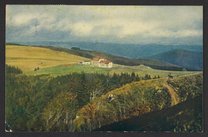Postcard from Carl Engler to Georg Bredig, February 1901
- 1901-Feb-18

Rights
Download all 2 images
PDFZIPof full-sized JPGsDownload selected image
Small JPG1200 x 804px — 168 KBLarge JPG2880 x 1930px — 849 KBFull-sized JPG3524 x 2362px — 1.2 MBOriginal fileTIFF — 3524 x 2362px — 23.9 MBCarl Engler (1842-1925), a German chemist and professor of chemistry, thanks Georg Bredig for sending his habilitation thesis Anorganische Fermente (Inorganic Ferments). In many Germanophone countries, a habilitation is a post-doctoral degree intended to demonstrate a scholar's capacity for research in his or her field, and is usually required to attain the rank of professor.
| Property | Value |
|---|---|
| Author | |
| Addressee | |
| Place of creation | |
| Format | |
| Genre | |
| Extent |
|
| Language | |
| Subject | |
| Rights | No Copyright - United States |
| Credit line |
|
| Additional credit |
|
| Digitization funder |
|
Institutional location
| Department | |
|---|---|
| Collection | |
| Series arrangement |
|
| Physical container |
|
View collection guide View in library catalog
Related Items
Cite as
Engler, Carl. “Postcard from Carl Engler to Georg Bredig, February 1901,” February 18, 1901. Papers of Georg and Max Bredig, Box 1, Folder 36. Science History Institute. Philadelphia. https://digital.sciencehistory.org/works/bro70mz.
This citation is automatically generated and may contain errors.
Image 1
Deutsche Reichspost Postkarte
An Herrn Dr. Bredig
Physikal. chemisches Institut
Leipzig
Universität
Image 2
Für freundliche Zusendung Ihrer Schrift über anorg. Fermente & über Katalyse, von dem Inhalt ich mit großem Interesse Kenntnis genommen habe, sage ich Ihnen verbindlichst danke.
Mit collegialem Gruß,
Ihr ergebenster C. Engler
Karlsruhe d. 18.II.1901.
Image 1
German Imperial Postal Service
To: Dr. Bredig
Physical Chemistry Institute
Leipzig
University
Image 2
I would like to sincerely thank you for sending me your work on inorganic ferments and catalysis. I read the content with great interest.
Kind regards,
Your faithful C. Engler
Karlsruhe, February 18, 1901






